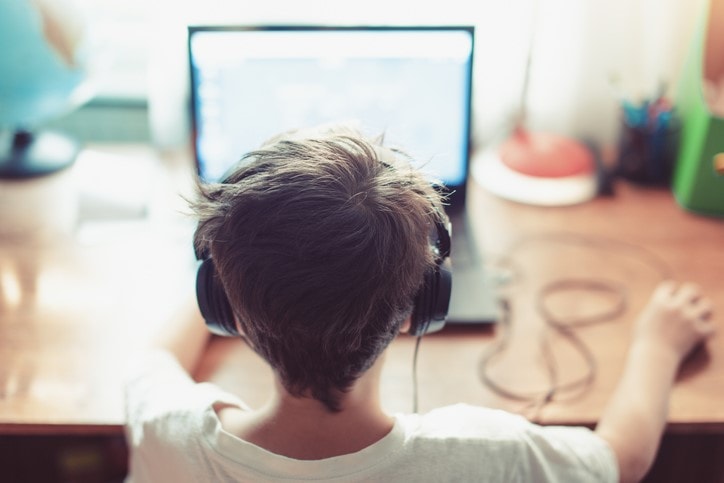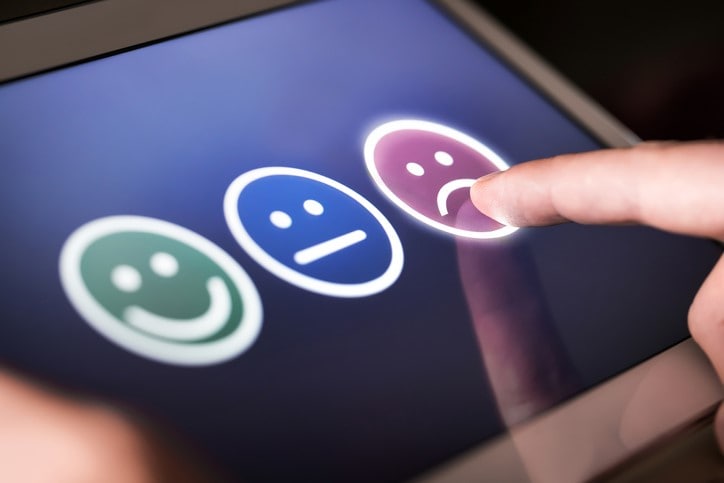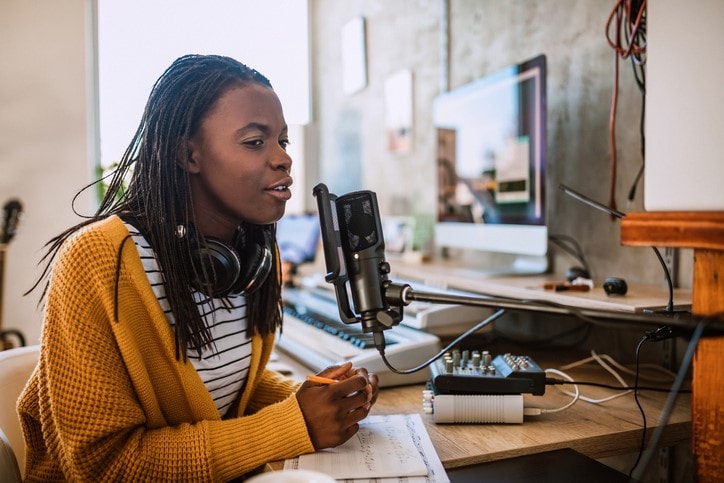/ News Posts / The Students’ Voice during the COVID-19 Disruption (Part 2 of 2)
The Students’ Voice during the COVID-19 Disruption (Part 2 of 2)
“There Is No Such Thing as Balance in Times Like These”
By NAfME Member Scott N. Edgar
Building on Part 1 of this blog, students have profound perspectives on e-learning and developing independence during these challenging times. Through their responses, we are learning a great deal about their current mindset, how they are responding to the situation, and perhaps most importantly, a more objective perspective on their in-school music education musically, socially, and emotionally. It should be noted that these responses were collected beginning the second day of remote instruction. Motivation, boredom, isolation, etc., should all be viewed through this temporal lens. These emotions and states will likely morph and become more extreme the longer this disruption continues.
We have built a culture during this year where reflection, discussion of emotions, and states of mind have become the norm. The students have begun to learn about the skills fostered in the music classroom that will follow them long after their formal education has ceased. The teachers have actively sought opportunities to build self-awareness, social-awareness, and responsible decision-making in a musically-embedded way. Through their music classes, they are building these skills. Initial findings suggest the students largely appreciate looking at music in a deeper way finding opportunities to make it personal. Further, the students’ ability to perceive their music teachers’ motives and attempts to teach life skills (these teachers have all done this regularly before this project) has greatly increased. The students are becoming more empathetic to each other, their teachers, and teaching.
Some Students Saw Benefits of Working Independently, But Not All
The students had mixed opinions of e-learning and working on ensemble work independently, but some saw a positive side of being able to guide their own learning. Many of these students’ thoughts resonate with current discussions in music education advocating for a more democratic classroom. These discussions capitalize on student voice and choice. While the beauty of group, ensemble instruction should never be lost, these student perspectives could inform honoring student goal-setting and independence moving forward once we return to in-person instruction.
Positive perceptions of independent learning:
I don’t have to wait for other people to finish getting help in order to play again.
It allows you to take the time to look over whatever you want. You can get as specific as you want in terms of how you go about practicing a section (since you are the one dictating how you want it to be practiced).
You don’t have to stop when someone is talking.
It has taught me a lot about myself and my time management, and I think that is a really important thing to know before college.
I am actually pretty productive on my own. It’s only been a few days, but I’ve been practicing my audition music, and it has improved drastically in a short amount of time. It allows me to work at my own pace and when I want to work while also getting to do it in the comfort of my own house where I feel less self-conscious to play.
I like it because I’m a fast worker and I can get things done faster.
The amount of time to practice is nice, but not having stuff (concerts) to work towards makes having the motivation to practice harder.
I get to work at my own pace and don’t have to worry about holding up the class if I have a question or if I’m struggling. I also have the freedom of deciding my own schedule and how long I work before I want to take a break in between classes. I feel like this freedom is also helping me work on my mental health because I don’t have to wake up super early to go to school and then go to bed really late after activities and homework. It’s not as stressful so it is helping me clear my mind a little to get healthier physically and mentally.
I can attack a piece of work in my own way. Whereas a teacher has a method which they think is suitable to learning something, I am more freely able to choose a method of my choosing. I’m also able to hear it various times for myself and decide what I want to work on.
Negative perceptions of independence:
I don’t have any benefits. I can’t figure out the music especially since there is no one to help.
I can’t seem to find the benefits, I’d rather work with others to be successful, since I need others to bounce off ideas to and get feedback.
I think e-learning days don’t really teach me anything. It’s just busywork to tide me over and keep my brain working till I go back to school.
There’s less stress, but personally I don’t like having the freedom. When I’m in class, there’s more pressure to do the work, and sometimes I need that pressure.
Students Vary in Their Ability to Adapt to Increased Time and Independence
While enjoying the freedom to explore and design their own schedules (usually resulting in sleeping later, smaller segments of work followed by breaks, and spending more time on hobbies), students were self-aware to understand this amount of time without structure was not always a good thing. However, some students stated they were using this time effectively (broadly conceived as academically and musically, but also socially and emotionally). These quotations should not be interpreted as positive or negative. Many of the students highlighting that they are not using their time productively cited that it is a response to previously being overcommitted and that they needed time to catch their breath.
Using time effectively:
I feel like there are so many hours in every day that I miss out on while I’m in school. When I’m on my own time, I can wake up early and make myself some oatmeal. I can finish my schoolwork and be done with school! I also really love alone time in general, and I hadn’t realized how much I needed a “free” week. It’s the best. My days are SO much longer.
The first two days I did not manage my time well playing video games. Yesterday and today I’m spending time writing a research paper for history class. I hope when school comes back that I can find balance, but we’ll see.
I am starting to find the balance between productivity and relaxation. I want to use this time to better myself.
I am exercising and sleeping. There is no such thing as balance in times like these.
Surprisingly yes, I have been utilizing the time for practicing my audition music, and it is really beneficial to me.
I’m trying to get things done around the house that I normally wouldn’t and also just take time to “just be” for a little bit. I don’t usually have time to just sit in my room during normal life, so in a way this is a little bit nice to have some time.
Now that I don’t have clubs and after-school activities anymore, I am using that extra time to entertain myself in the effective quarantine of my home. I’ve been reading, doing puzzles, and now, doing schoolwork.
With the increased amount of time I’ve been trying to find the balance between doing work and enjoying life. Right now, it’s been way more relaxed because I’m in charge of my own schedule. At the end of the day, I’m able to finish what I’m assigned.
I just try to finish as soon as possible, but do it right since I have to help take care of my younger siblings.
I wake up at around the same time I do every day, but I take a little extra time to sit and have a conversation with my brother, not worry about being late to rehearsal or a concert. I realize now that I never have nothing going on. Every day, there is a plan after school. That gives me no time to really connect with anyone in my life outside of the fine arts program. I’m finding a balance, and it’s beautiful.
I’m finding a pattern. How to manage my time without making my brain explode. The breaks in between have actually made my focus and work-skill improve.
Finish my work as quickly as possible so I have the rest of the day to destress from the anxiety of being quarantined.
Aware of not using time effectively, but trying:
Right now, I’m just relaxing a lot. It’s been a long time since I’ve had literally nothing to do each day, so it’s really nice that we have this extended break. I do hope to work more towards planning college and writing pieces . . . maybe draw a few things and read a book, but right now I’m just finishing up this game I’ve been stalling on for months.
Currently I am not, but I am working on staying productive and healthy.
Starting to balance . . . it’s been a lot of binging Netflix.
I’ve utilized this to take a little spiritual break. I will find balance shortly, probably tomorrow.
While I haven’t practiced much or done anything school-related, I have been more helpful to my parents around the house, and while I do spend a lot of time just playing video games, I don’t feel like that’s the main part of each day.
I don’t think I’ve been using my time very wisely, but I think I’ll be able to balance it a little better after a while because I’ll be bored of going on my phone all day.
Not using time effectively:
I feel like I am wasting my time without a structure to my day.
I’m not using it wisely, but I don’t really care because I feel like I deserve a break from school work.
I’m working on it. At the moment, my laziness is overcoming my work.
I would say actually I am disappointed with myself for my lack of time, and hope that the hint of a schedule with e-learning makes me more responsible.
I’m finding it hard to stay focused.
I don’t think I’m using my time very wisely. I’ve mostly been watching Netflix.
I am using my extra time to play video games. It probably isn’t the most productive thing to do, but it helps me relax and think about things that aren’t COVID-19.
I’m not really using it that well—I’ve not been feeling that motivated to start, and there’s other things that are more important to me than band right now.
This is the most free time I’ve had in a while and I’m not sure what to do with it.
What We Can We Learn from Our Students
- Group instruction can be frustrating for students who value autonomy and the ability to work on their own. This disruption has exposed the value of independence, student goal-setting, and personal ownership towards a musical outcome. These comments also highlight the importance for students to “learn their parts outside of rehearsal.” This could be a tangible moment to highlight the importance of individual preparation within an ensemble setting. This independent work is the practicing we all hope our students complete! We can use this disruption to help instill the skills and disposition for individual work and contribution to the class.
- Our students need our help guiding them through scheduling their time. It is a huge leap from being scheduled every second during the school day to being left to their own devices (literally!). While not being prescriptive, simply asking students how their days are flowing can help them become more aware of falling into patterns of apathy and latency, or at the very least unproductivity.
- The typical school day with an early start time may not align with students’ ability to optimally learn. Ask your students what time of day is their best time to learn. This can inform both your teaching and their learning online and in person.
Many of these quotations suggest the formality and structure of school is needed for some, but stifling and inhibiting for others. This disruption represents a potential turning point in many of our classrooms. Positive outcomes could include:
- An increase in student accountability and ownership.
- Students being able to take a more active and accurate role in short- and long-term goal-setting.
- Increased empathy for each other’s strengths and challenges.
- A renewed vigor, appreciation, and love for music and music education.
For this potential to become a reality we need to plant these seeds for our students now. We can come out stronger on the other side if we prioritize teaching our students social and emotional skills with the same focus and structure that we teach music. We are all going through experiences that will change our lives. The time is now to long for what we are missing, help our students through the present, and prepare for brighter, more musical days ahead!
View the recent webinar with Scott Edgar, “Music Education and SEL during COVID-19: Resiliency and Empathy Now More Than Ever.” Also available are the PDF of the PowerPoint presentation and professional development recognition after viewing a brief quiz. More resources are available on the Professional Learning Community resource page.
About the author:
 Dr. Scott N. Edgar is in his eighth year as Associate Professor of Music, Music Education Chair, and Director of Bands at Lake Forest College. He received his Doctorate of Philosophy in Music Education from the University of Michigan, his Masters degree in Education from the University of Dayton, and his Bachelor of Music in Music Education degree from Bowling Green State University. Prior to his work in higher education he taught K-12 instrumental music in Ohio and Michigan. Dr. Edgar is the author of Music Education and Social Emotional Learning: The Heart of Teaching Music and is an internationally sought-after clinician on the topic. In addition to clinics, he also teaches graduate courses on Musical Social-Emotional Learning at VanderCook College of Music. Dr. Edgar is a Conn-Selmer Educational Clinician and VH1 Save the Music Foundation Educational Consultant. Dr. Edgar is a member of the National Association for Music Education, the American Educational Research Association, the College Music Society, Phi Mu Alpha Sinfonia Music fraternity and Kappa Kappa Psi Band fraternity. He lives in Lake Villa with his wife Steph, their son Nathan, and their cats Elsa and Wolfie.
Dr. Scott N. Edgar is in his eighth year as Associate Professor of Music, Music Education Chair, and Director of Bands at Lake Forest College. He received his Doctorate of Philosophy in Music Education from the University of Michigan, his Masters degree in Education from the University of Dayton, and his Bachelor of Music in Music Education degree from Bowling Green State University. Prior to his work in higher education he taught K-12 instrumental music in Ohio and Michigan. Dr. Edgar is the author of Music Education and Social Emotional Learning: The Heart of Teaching Music and is an internationally sought-after clinician on the topic. In addition to clinics, he also teaches graduate courses on Musical Social-Emotional Learning at VanderCook College of Music. Dr. Edgar is a Conn-Selmer Educational Clinician and VH1 Save the Music Foundation Educational Consultant. Dr. Edgar is a member of the National Association for Music Education, the American Educational Research Association, the College Music Society, Phi Mu Alpha Sinfonia Music fraternity and Kappa Kappa Psi Band fraternity. He lives in Lake Villa with his wife Steph, their son Nathan, and their cats Elsa and Wolfie.
Did this article spur new ideas for your music program? Share them on Amplify! Interested in reprinting this article? Please review the reprint guidelines.
The National Association for Music Education (NAfME) provides a number of forums for the sharing of information and opinion, including blogs and postings on our website, articles and columns in our magazines and journals, and postings to our Amplify member portal. Unless specifically noted, the views expressed in these media do not necessarily represent the policy or views of the Association, its officers, or its employees.
March 31, 2020. © National Association for Music Education (NAfME.org)
Published Date
March 31, 2020
Category
- Uncategorized
Copyright
March 31, 2020. © National Association for Music Education (NAfME.org)










